The subscription billing software is crucial for organizations pursuing subscription-based models since it handles subscription transactions along with invoices and payment procedures. These tools operate for companies with SaaS programs and e-commerce functions as well as digital services businesses to manage their billing needs, maintain lower customer turnover and better control cash flow. These software solutions were developed to meet the needs of four major groups including developers, finance departments, marketing teams and business administration executives.
They present flexible pricing options combined with automation features, security measures and extensive analytical reporting tools. This list includes tools that meet certain primary standards such as flexible billing solutions as well as automation features security compliance and payment gateway accessibility with reporting functionality and business growth scalability options.
Criteria for Selecting the Best Subscription Billing Software
- Automated Invoicing & Billing: It must automate recurring payments, generate invoices, and handle different billing cycles to prevent time and mistake wastage. The right subscription billing software ensures this process runs smoothly and efficiently.
- Multi-Payment Gateway Integration: It must support the integration of multiple payment gateways like credit/debit cards, digital wallets, ACH transfers, and international payment gateways to ensure customer ease.
- Dynamic Pricing Models: Handling multiple pricing plans, including tiered, usage-based, freemium, and hybrid, allows companies to react to many different customer requests.
- Satisfactory Management & Revenue Recovery: Streamlined dunning processes prevent churn by attempting failed payments, sending reminder notifications, and suspending accounts. A reliable subscription billing software makes managing these processes seamless.
- Tax Compliance & International Support: Taxes (VAT, GST) should be automatically calculated and international finance standards like GDPR, ASC 606, and IFRS 15 should be complied with.
- Subscription Lifecycle Management: Trial management, plan upgrades/downgrades, cancellations, and renewals should be handled smoothly. Using a subscription billing software simplifies these tasks for both businesses and customers.
- Customer Self-Service Portal: Simple-to-use customer portal for their subscription management, payment information change, and invoice viewing enhances the customer experience.
- Third-Party Integration: Support for integrating CRMs, accounting solutions (including QuickBooks, Xero), and analytical solutions guarantees trouble-free performance. This subscription billing software enhances connectivity, making financial and customer data management seamless.
- Scalability & Performance: The solution must be capable of handling increasing numbers of subscribers as well as business transactions without succumbing to diminished performance. This subscription billing software is designed to scale effortlessly alongside growing business demands.
- Advanced Analytics & Reporting: Real-time dashboards, revenue projections, churn analysis, and financial reporting facilitate businesses to maximize their subscription plans.
- Security & Fraud Prevention: PCI-DSS compliance and fraud prevention software protect customer details and transactions.
- Good Customer Support: 24/7 support via multiple channels ensures easy problem resolution and smooth operations.
List of 15 Subscription Billing Software
1. Chargebee
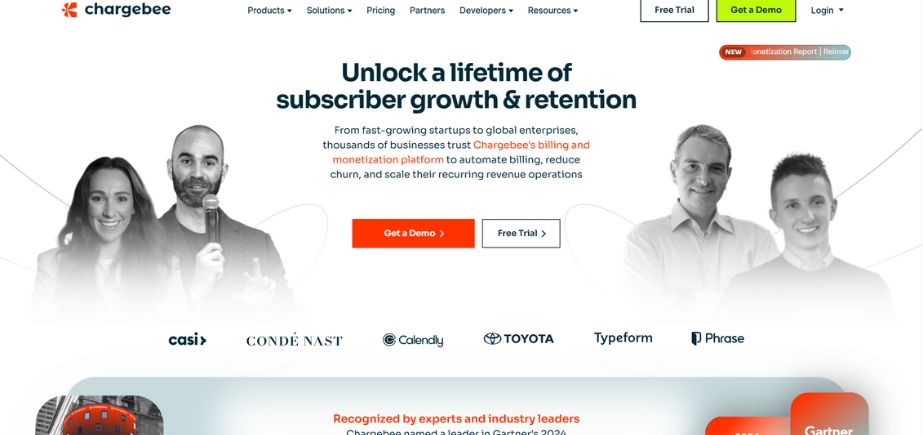
Chargebee is a strong recurring billing and subscription management software that handles billing, revenue recognition, and compliance automatically. Chargebee offers various pricing models such as flat-rate, usage-based, and hybrid plans and therefore is applicable to various industries. This subscription billing software is designed to scale with growing business needs.
Chargebee is integrated with payment gateways such as PayPal, Stripe, and Braintree to provide firms with an effortless billing process. It is integrated with management, tax automation, analytics, and custom invoicing features. With scalability and automation at its center, Chargebee is the perfect fit for SaaS, e-commerce, and subscription-based companies looking for a robust, revenue-driven solution.
Key Features:
- Automated invoicing and recurring billing
- Multi-currency and tax compliance support
- Dunning management and revenue recovery tools
- Advanced analytics and revenue recognition
Pros:
- Highly customizable and scalable
- Integrates with major payment gateways and CRMs
Cons:
- Can be complex for small businesses
- Pricing is higher for growing startups
Pricing:
Free plan available; paid plans start at $599/month
Who Should Use It?
SaaS companies, digital businesses, and enterprises needing flexible subscription management.
2. Recurly
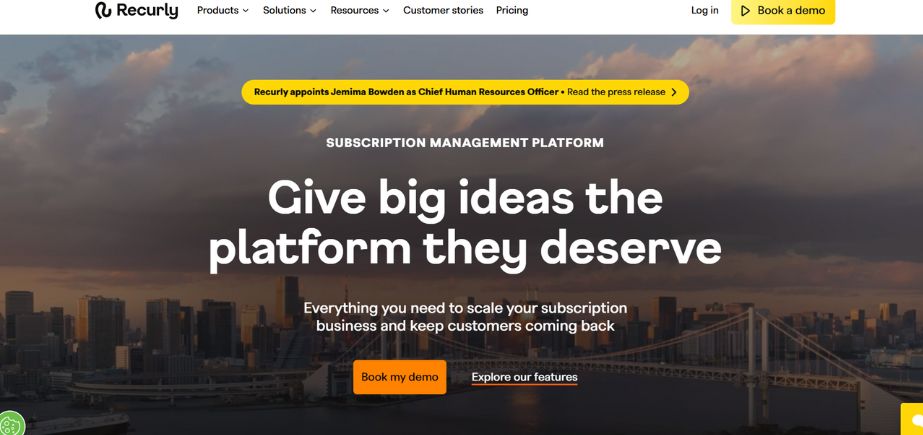
Recurly is business-level subscription billing software that assists companies in the easy management of recurring revenues. Recurly features several payment plans, automatic payments, and revenue recuperation to help companies decrease churn. Its analytics tool gives in-depth details about the action taken by the subscriber and assists companies in optimizing their pricing model.
It also comes with integration support for leading CRMs, ERPs, and accounting platforms for easy finances. With its fraud protection security, promotion discounts, and live pricing, Recurly is a good fit for subscription businesses requiring a robust and capable billing system. This subscription billing software ensures both security and scalability.
Key Features:
- Smart dunning and revenue recovery tools
- AI-driven subscription analytics
- Multi-currency and tax compliance support
- Customizable invoicing and billing cycles
Pros:
- Robust fraud prevention and security features
- Supports a wide range of payment gateways
Cons:
- Expensive for small businesses
- Requires some technical knowledge for setup
Pricing:
Custom pricing; contact sales for details
Who Should Use It?
Mid-sized to large subscription businesses looking for enterprise-grade automation.
3. Zuora
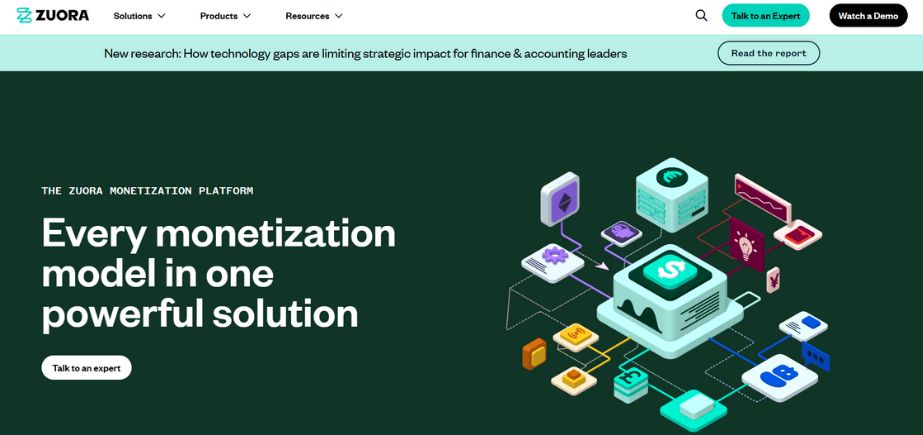
Zuora is a cloud solution for subscription billing and revenue automation for companies that have complicated billing needs. Zuora supports multiple pricing models, including usage-based, tiered, and hybrid plans, in order to facilitate companies to grow effectively. Zuora automates invoicing, taxation, and financial reporting to reduce manual efforts.
Its analytics allow companies to forecast revenue and optimize customer retention. Support for prominent payment processors and ERP applications, Zuora is a favorite among companies with large-scale subscription companies across different sectors. This subscription billing software is built to handle enterprise-level complexities.
Key Features:
- Automated billing and invoicing
- Subscription lifecycle management
- Revenue recognition and reporting
- Integration with CRMs and ERPs
Pros:
- Highly scalable for large enterprises
- Strong compliance and accounting features
Cons:
- Steep learning curve
- Higher pricing than some competitors
Pricing:
Custom pricing; contact sales
Who Should Use It?
Large enterprises with complex subscription models and compliance needs.
4. Stripe Billing
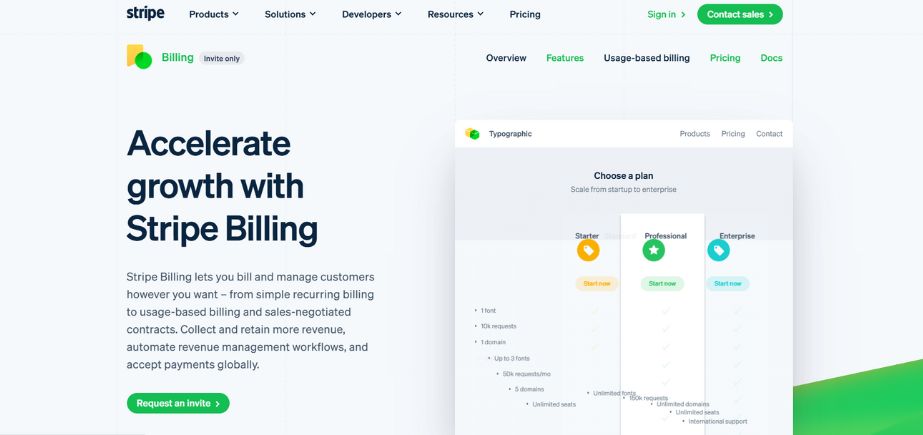
Stripe Billing provides subscription companies with a scalable developer-oriented billing system. Stripe Billing offers three key functions which include automatic billing periods alongside usage reporting as well as an automated fee collection system to boost revenue potential. Through their APIs, Stripe guides companies to instantly configure automatic subscription and billing operations.
Stripe Billing enables worldwide payments through its functionality to process different payment methods and currencies around the world. This subscription billing software is designed to support global businesses with flexibility. Online retailers together with SaaS companies and startups seeking a safe and expandable billing solution will find Stripe Billing the most appropriate option.
Key Features:
- Customizable billing and pricing models
- Automated invoicing and tax management
- Advanced fraud protection
- API-first approach for easy integrations
Pros:
- Developer-friendly with robust API support
- Simple and cost-effective pricing
Cons:
- Limited built-in reporting features
- Requires technical expertise for customization
Pricing:
0.5% per recurring transaction, additional fees for advanced features
Who Should Use It?
Startups, developers, and SaaS businesses needing flexible billing solutions.
5. Chargify
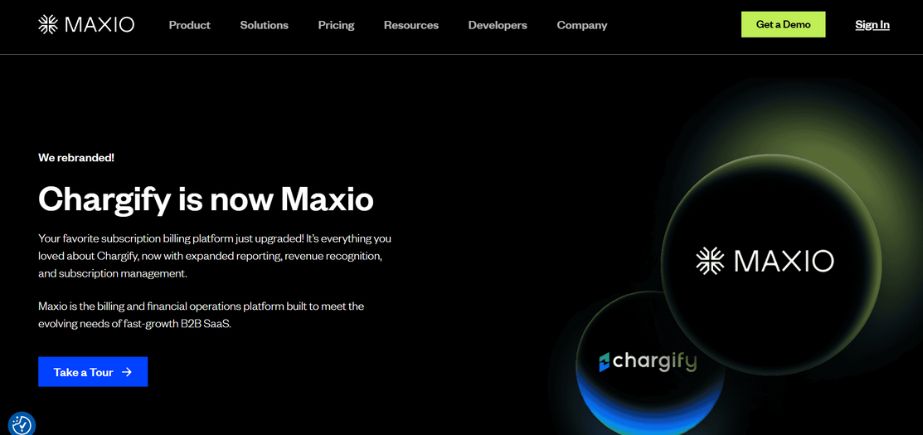
The subscription billing platform Chargify addresses the complicated pricing needs of organizations that need flexible rates. The system allows users to handle dynamic pricing as well as event-based pricing and revenue management across multiple sites. Chargify enables businesses to deliver adjustable subscription plans that incorporate volume-based pricing solutions and prepaid credits as well as metered billing models.
Chargify combines software programs including Salesforce and QuickBooks to enhance the efficiency of financial operations. This subscription billing software helps businesses streamline billing while ensuring accuracy and scalability. Organizations requiring complex billing solutions together with revenue recognition analytics and automated capabilities should adopt Chargify because it serves SaaS companies and B2B organizations best.
Key Features:
- Customizable billing logic
- Advanced revenue analytics
- Dunning and churn management
- Multi-currency and tax compliance
Pros:
- Great for handling complex pricing structures
- Strong analytics and reporting features
Cons:
- Not beginner-friendly
- Higher pricing than some competitors
Pricing:
Starts at $599/month
Who Should Use It?
Subscription businesses with complex billing structures and analytics needs.
6. Paddle

SaaS companies exclusively benefit from Paddle which operates as an all-in-one platform for subscription and payment management. This platform fulfills international tax compliance responsibilities and performs fraud prevention along with customer billing which reduces the requirement for multiple third-party integrations. With managed checkout from Paddle businesses can simplify purchasing while their analytics grant insights about customer behavior and delivery trends.
Organizations use Paddle to handle their recurring payments combined with refunds and to modify subscription levels effortlessly. This subscription billing software offers businesses an all-in-one platform to simplify payments and compliance. Software firms should consider Paddle as their subscription management solution since it provides a complete package of features combined with user-friendly design and automatic compliance capabilities.
Key Features:
- End-to-end subscription management
- Automated tax handling and compliance
- Fraud prevention and chargeback protection
- Global payment support
Pros:
- Handles all tax and compliance burdens
- Ideal for international SaaS businesses
Cons:
- Limited customization options
- Transaction fees can add up
Pricing:
Custom pricing with revenue-based fees
Who Should Use It?
SaaS businesses needing a hassle-free, fully managed billing solution.
7. PayKickstart
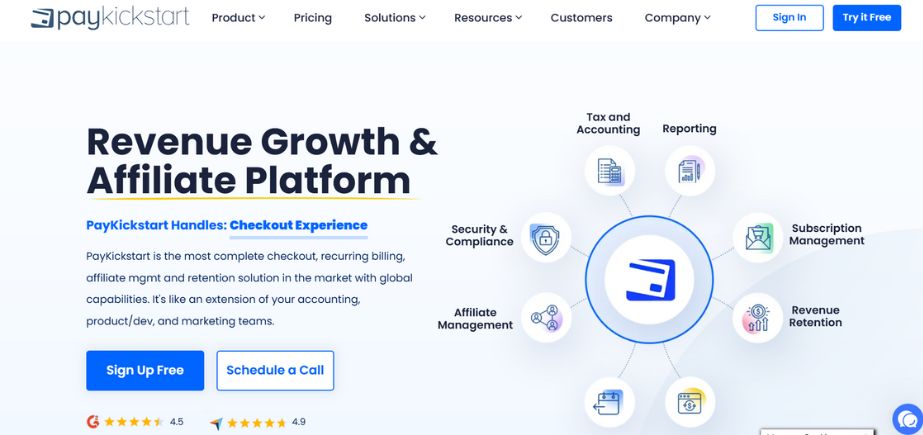
PayKickstart functions as subscription billing software that manages affiliates while performing automated invoicing tasks and handling dunning activities as well as offering customizable checkout systems. The software enables businesses to process payments through important gateways such as Stripe, PayPal and Authorize.net which provides smooth billing capabilities. Businesses can raise revenue through PayKickstart by taking advantage of its built-in marketing tools which include one-click upsells order bumps and promotional discounts.
The software offers applications for affiliate management which transparently tracks referrals as well as assists businesses with commission administration. This subscription billing software supports growing businesses with flexible billing and affiliate management tools. Any digital marketer SaaS business or online business can use PayKickstart to provide their customers with an advanced subscription billing system that expands to meet their needs.
Key Features:
- Automated subscription billing and dunning management
- Affiliate management and commission tracking
- Multiple payment gateway integrations
- Custom checkout pages and upsell features
Pros:
- Strong affiliate marketing tools
- Easy-to-use interface
Cons:
- Limited customization for invoices
- Higher transaction fees compared to some competitors
Pricing:
Starts at $99/month
Who Should Use It?
Online businesses, SaaS companies, and digital marketers looking for subscription billing with affiliate management.
8. Billsby
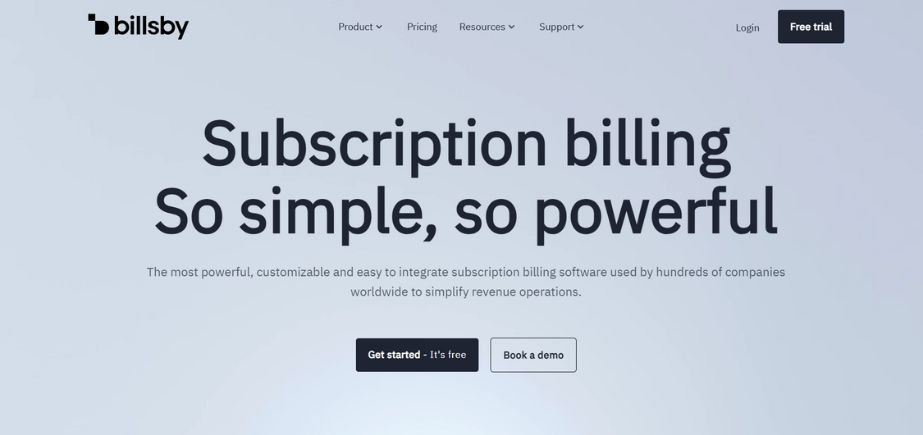
Companies can use Billsby as no-code subscription billing software to obtain a user-friendly scalable billing option. The software system delivers automated invoicing alongside self-service customer portals and joins CRM with accounting tools. The pricing structures at Billsby encompass fixed options along with usage-based and tiered elements which makes the platform suitable for different industrial sectors.
Through its software businesses can customize branding features while handling customer subscriptions and conducting reports. This subscription billing software is designed for ease of use, making it ideal for startups and small businesses. Startups and small businesses together with non-technical teams should select Billsby since it features an intuitive interface at affordable rates.
Key Features:
- Drag-and-drop subscription plan builder
- Automated invoicing and tax compliance
- Customer self-service portal
- Integration with major payment gateways
Pros:
- No coding required
- Affordable pricing for small businesses
Cons:
- Limited advanced analytics
- Fewer integrations than enterprise-level solutions
Pricing:
Starts at $45/month + 0.4% transaction fee
Who Should Use It?
Small businesses, startups, and entrepreneurs needing a simple subscription billing solution.
9. FastSpring
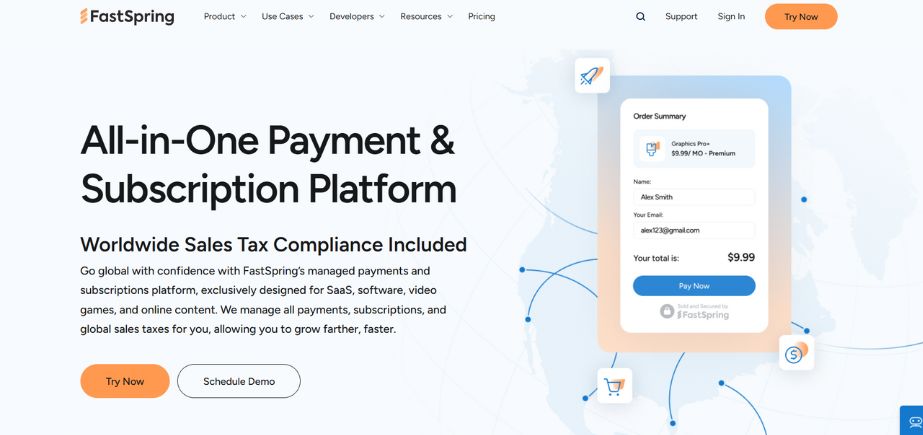
FastSpring is an end-to-end subscription and e-commerce billing solution built for digital companies. It facilitates global payment processing, tax compliance, and dynamic subscription models to enable businesses to grow globally. FastSpring automates pricing updates, refunds, and invoicing, taking the load off finance teams.
The solution also has in-built fraud protection and analytics capabilities to maximize security and revenue growth optimization. This subscription billing software ensures secure transactions while supporting scalable growth. It’s perfect for software businesses, digital content providers, and e-learning sites that are looking for an efficient, everything-in-one-billing solution.
Key Features:
- Global payment processing and tax compliance
- Subscription and one-time payment support
- Automated invoicing and localization
- Fraud prevention and chargeback management
Pros:
- Handles global payments and taxes seamlessly
- Strong security and fraud protection
Cons:
- Higher transaction fees for smaller businesses
- Limited reporting customization
Pricing:
Revenue-based pricing; contact sales for details
Who Should Use It?
SaaS companies, e-commerce businesses, and digital product sellers operating globally.
10. Zoho Subscriptions
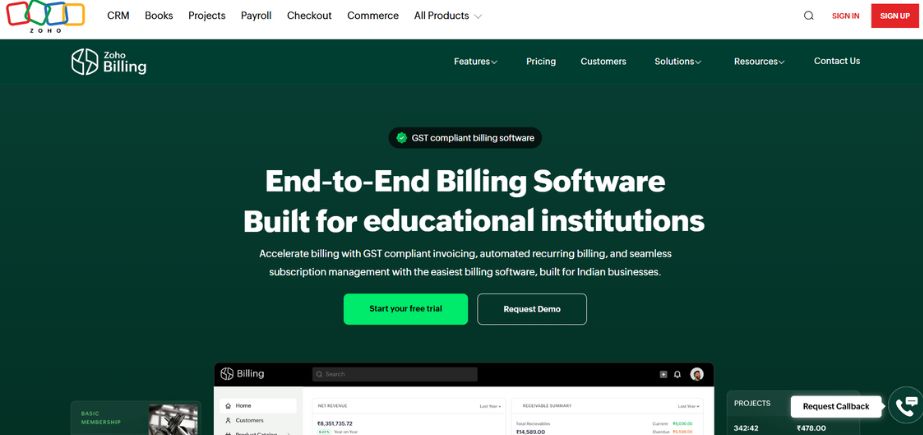
Zoho Subscriptions functions as an easy-to-use subscription billing system that offers affordable solutions for small and mid-sized organizations. The software system enables automated recurring billing together with metered usage management and fully integrates with all Zoho business applications.
Consumers can create personalized bills as well as perform multi-currency billing while using Zoho’s dashboard to monitor their revenue performance. This subscription billing software empowers businesses with flexibility, cost-effectiveness, and advanced management tools. Zoho Subscriptions meets the needs of expanding businesses because it matches their budget while providing advanced subscription management capabilities.
Key Features:
- Automated recurring billing and invoicing
- Dunning and revenue recovery tools
- Multi-currency and tax compliance
- Integration with Zoho CRM, Books, and other tools
Pros:
- Cost-effective for small businesses
- Seamless integration with other Zoho products
Cons:
- Limited third-party integrations
- Not ideal for complex billing models
Pricing:
Starts at ₹1499 per Organization per Month
Who Should Use It?
Small businesses and startups using Zoho’s ecosystem.
11. SaaSOptics
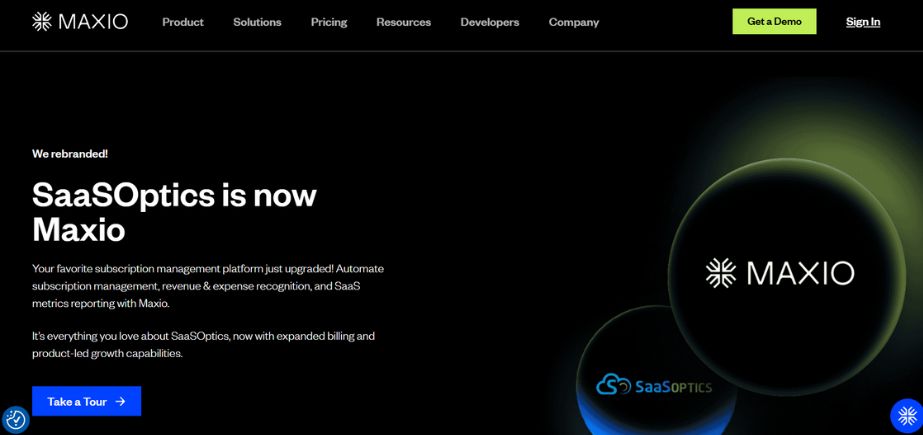
Businesses focused on subscription billing revenue recognition and financial reporting should use SaaSOptics because it serves as their financial operations platform. The platform runs complex financial operations which reduce time-consuming manual accounting routines. Through its platform users can view important metrics including customer lifetime value together with ARR along with revenue retention numbers.
SaaSOptics connects to CRMs and accounting systems which enables smooth financial operation management and serves well those B2B SaaS businesses requiring subscription revenue processing at scale. This subscription billing softwaree is ideal for handling large-scale SaaS financial operations.
Key Features:
- Automated revenue recognition and reporting
- Subscription lifecycle management
- Customer payment tracking
- SaaS-specific financial metrics
Pros:
- Strong financial reporting and analytics
- Ideal for SaaS businesses with complex financial needs
Cons:
- Not beginner-friendly
- Expensive for startups
Pricing:
Custom pricing; contact sales
Who Should Use It?
Growing SaaS businesses needing advanced financial management.
12. Maxio (formerly SaaSOptics & Chargify)
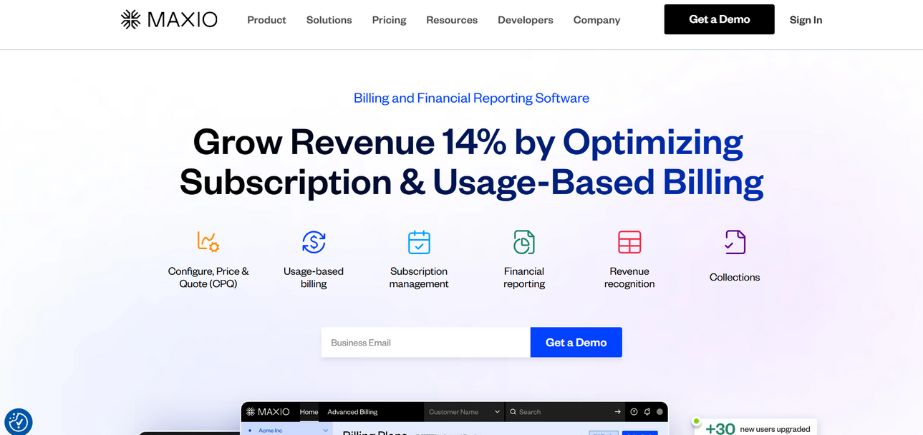
The Maxio solution integrates SaaSOptics financial analytics function with Chargify subscription billing features. The platform includes high-end revenue recognition tools together with automated billing systems that offer business intelligence capabilities. Recurring billing functions enable businesses to create forecast data and produce real-time financial statement reports.
When combined with Maxio this platform provides SaaS businesses with an excellent solution through its comprehensive financial intelligence and scalable billing infrastructure for sophisticated revenue management. This subscription billing softwaree supports advanced revenue tracking and scalability for growing SaaS companies.
Key Features:
- Custom pricing and billing models
- Revenue recognition and compliance tools
- Detailed financial reporting and analytics
- Dunning and churn reduction automation
Pros:
- Great for companies with complex billing structures
- Strong compliance and financial tracking
Cons:
- Higher learning curve
- Premium pricing
Pricing:
Custom pricing; contact sales
Who Should Use It?
Mid-sized to large SaaS companies needing comprehensive financial management.
13. Fusebill
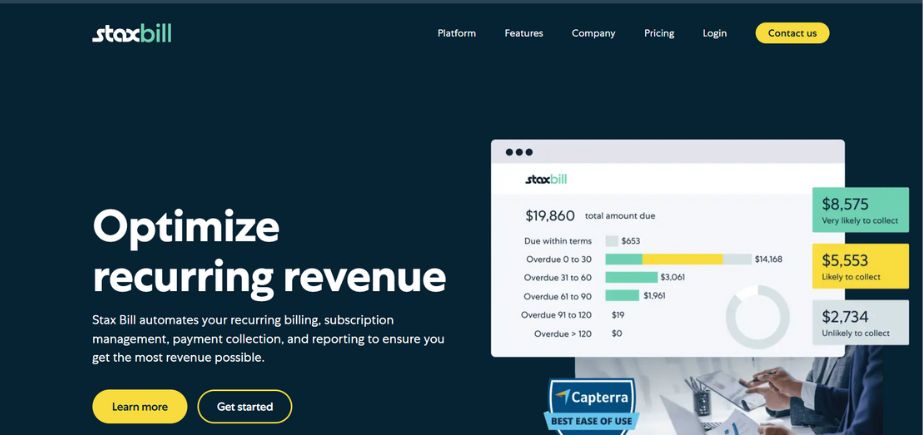
Automated subscription billing and revenue management functions through Fusebill help businesses operate recurring revenue operations efficiently. Fusebill enables businesses to set various pricing models including usage-based tiered and volume-based which helps them address different customer needs. Supported by self-service portals Fusebill helps customers handle subscriptions independently which leads to decreased maintenance requirements for staff support teams.
The payment collection invoicing and revenue recognition features of Fusebill operate automatically which delivers both improved precision and efficiency at work. This subscription billing software automates billing workflows while integrating seamlessly with leading business tools. The connected features between Fusebill and CRMs, ERPs, and accounting tools including Salesforce, NetSuite, and QuickBooks turn this system into a top solution for organizations that need advanced billing automation at different levels of business growth.
Key Features:
- Flexible pricing and billing models
- Automated invoicing and dunning
- Revenue recognition and forecasting
- Payment gateway integrations
Pros:
- Scalable for growing businesses
- Strong automation features
Cons:
- Higher pricing than some alternatives
- Requires some setup effort
Pricing:
Starts at $499/month
Who Should Use It?
Growing businesses and enterprises needing scalable subscription billing.
14. Vindicia
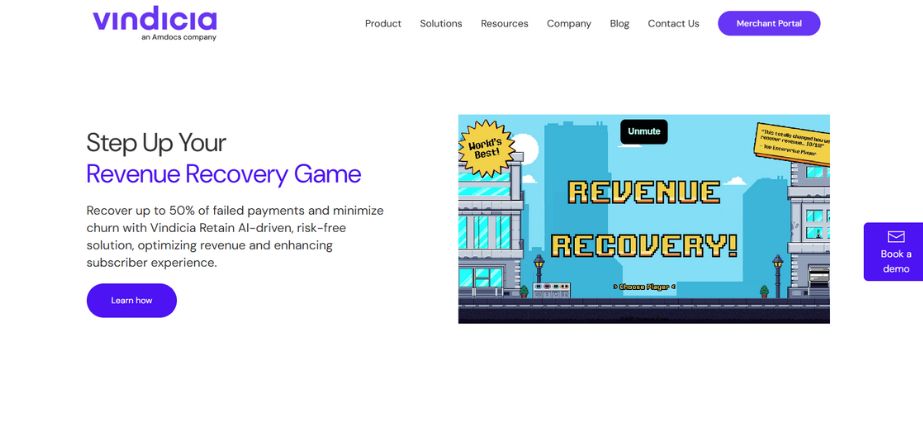
Vindicia is an enterprise-class subscription billing solution that is specially built to automate recurring revenue. It has anti-fraud, pay recovery automation, and advanced analytics to help businesses minimize churn and maximize customer retention. Vindicia’s payment engine accommodates multiple pricing plans and foreign payments to facilitate clean transactions for businesses that are running globally in any industry.
Real-time reporting and revenue measurement allow businesses to optimize their subscription model. This subscription billing software enables enterprises to boost revenue while improving customer payment experiences. Ideal for digital services, gaming, and media businesses, Vindicia maximizes the subscription revenues of an enterprise by making customers’ payment process smooth and flawless.
Key Features:
- Subscription lifecycle management
- AI-powered churn prediction
- Global payment processing
- Fraud detection and chargeback management
Pros:
- Strong fraud prevention and security
- AI-driven insights to reduce churn
Cons:
- Enterprise-level pricing
- Complex setup process
Pricing:
Custom pricing; contact sales
Who Should Use It?
Enterprises and businesses with high-risk subscription models.
15. JustOn
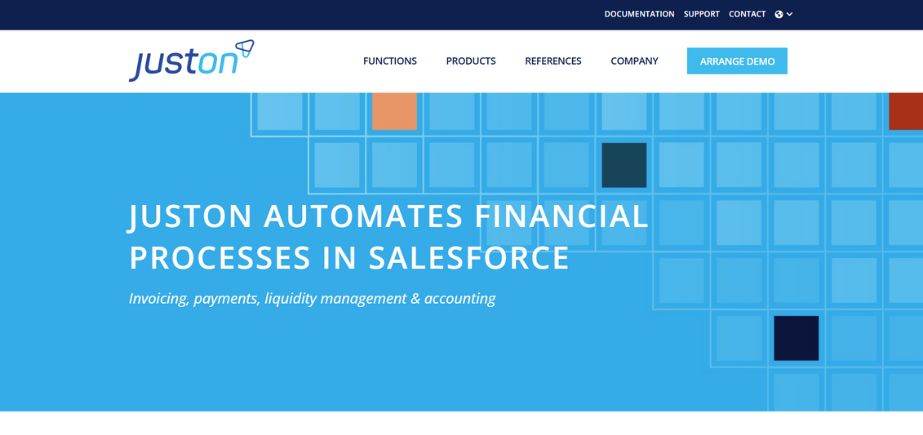
The JustOn platform functions as a subscription billing cloud solution that serves business customers utilizing Salesforce CRM. The system optimizes billing durations as well as agreement monitoring and revenue tracking functions to decrease manual accounting responsibility. JustOn supports a selection of billing approaches including fixed fees and tiered and metered pricing that suits different business sectors.
JustOn functions within the Salesforce framework making it possible for businesses to use one system that lets them handle customer subscriptions and financial transactions. This subscription billing software empowers organizations with automation, accuracy, and compliance in managing recurring billing. The billing software from JustOn serves businesses in SaaS telecom and financial services and helps them execute automatic recurring billing and revenue processes with increased efficiency as well as accuracy and compliance.
Key Features:
- Automated invoicing within Salesforce
- Subscription and contract management
- Customizable billing workflows
- Revenue recognition and reporting
Pros:
- Native Salesforce integration
- Highly customizable billing processes
Cons:
- Limited use outside the Salesforce ecosystem
- Requires Salesforce expertise to set up
Pricing:
Custom pricing; contact sales
Who Should Use It?
Salesforce users and enterprises needing integrated billing solutions.
Comparison Between Different Subscription Billing Software
Here is a comparison table for the subscription billing software you mentioned:
| Software | Key Features | Pricing | Best For | Website |
| Chargebee | Automated billing, dunning management, metered billing, analytics, integrations with multiple payment gateways | Starts at $599/month | SaaS, e-commerce, and subscription-based businesses | chargebee.com |
| Recurly | Subscription lifecycle management, automated invoicing, revenue recovery, multiple payment methods | Custom pricing | Enterprises managing high-volume recurring revenue | recurly.com |
| Zuora | Usage-based pricing, automated invoicing, revenue forecasting, financial reporting | Custom pricing | Large enterprises with complex billing needs | zuora.com |
| Stripe Billing | Flexible billing cycles, smart revenue recovery, metered usage tracking, API integrations | Pay-as-you-go model | Startups and tech-driven businesses | stripe.com/billing |
| Chargify | Dynamic billing, event-based pricing, revenue recognition, integrations with CRMs | Custom pricing | B2B SaaS, subscription businesses with evolving pricing models | chargify.com |
| Paddle | Global tax compliance, fraud prevention, managed checkout, multi-currency support | Custom pricing | SaaS companies selling globally | paddle.com |
| PayKickstart | Automated invoicing, dunning management, affiliate management, one-click upsells | Starts at $99/month | Digital marketers, SaaS, online businesses | paykickstart.com |
| Billsby | No-code subscription management, customer portals, CRM/accounting integrations | Starts at $45/month | Startups, small businesses | billsby.com |
| FastSpring | E-commerce billing, global payments, tax compliance, localized checkout | Custom pricing | Digital businesses, SaaS, e-learning platforms | fastspring.com |
| Zoho Subscriptions | Recurring billing, metered billing, Zoho ecosystem integration, revenue analytics | Starts at ₹1499per Organization per Month | Small and medium businesses using Zoho products | zoho.com/subscriptions |
| SaaSOptics | Revenue recognition, financial reporting, subscription analytics, automated workflows | Custom pricing | B2B SaaS companies | saasoptics.com |
| Maxio | Combines SaaSOptics & Chargify features, advanced subscription analytics, revenue automation | Custom pricing | SaaS businesses needing robust billing & financial analytics | maxio.com |
| Fusebill | Recurring billing, revenue tracking, customer self-service portals, API integrations | Starts at $499/month | Scaling subscription-based businesses | fusebill.com |
| Vindicia | Fraud protection, churn reduction, revenue recovery, global payment options | Custom pricing | Media, gaming, digital service providers | vindicia.com |
| JustOn | Salesforce-native invoicing, contract management, automated billing & revenue tracking | Custom pricing | Businesses using Salesforce CRM | juston.com |
Conclusion
Subscription billing software selection requires businesses to determine their size and industry together with their unique requirements. The subscription billing applications Chargebee and Recurly provide exceptional automation capabilities and scale features to SaaS companies. Stripe Billing provides API integrations for developers who need these features yet Paddle helps SaaS businesses handle their subscription management across worldwide markets.
Small companies will find Zoho Subscriptions along with Billsby as ideal solutions because they provide budget-friendly functionality along with user-friendly interfaces. Businesses at the enterprise level use Zuora mainly for its sophisticated revenue automation capabilities and analytics features. For businesses focused on compliance along with fraud protection Vindicia and FastSpring should be their choices. All these platforms deliver different attributes to help organizations run efficient recurring billing operations while boosting revenue monitoring capabilities as well as retaining customers better. Financial operations achieve long-term growth along with better efficiency when businesses choose appropriate tools for their needs.
FAQs
1. What is subscription billing software?
Subscription billing software applies to automate revenue management, invoicing, and payments for business organizations offering subscription-based services. It handles payment tracking, customer subscriptions, price model management, and tax as well as financial compliance.
2. Which businesses need subscription billing software?
Any business that operates on a repeat revenue model, like SaaS companies, video streaming channels, websites, and subscription enterprises, will profit from using subscription billing software to automate the bill, reduce the risk of human error, and promote customer loyalty.
3. What are the most essential qualities that I ought to look for in subscription billing software?
Chief among the critical characteristics are auto-invoicing, multiple gateway support, tax requirements, dunning, reports, and tiered or usage-based pricing strategies. This subscription billing software ensures businesses can manage complex billing needs with ease and efficiency.
4. Which is the top subscription billing platform for small companies?
Zoho Subscriptions, Billsby, and Gusto are suitable for small companies due to their cost-effectiveness, simplicity, and inclusion of their best automation functionalities. This subscription billing software selection is ideal for startups and small businesses looking for affordability with automation.
5. How do I select the best subscription billing tool?
Review the price, current system interoperability, scalability, compliance support, automation features, and customer services to select an option that will suit your company’s needs. The right subscription billing software will align these factors to ensure long-term efficiency and growth.

